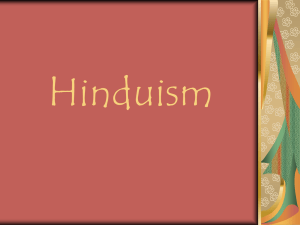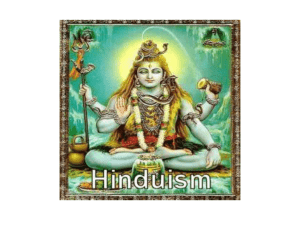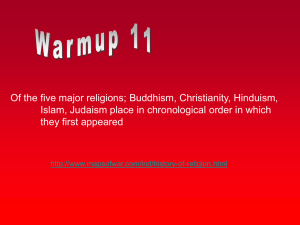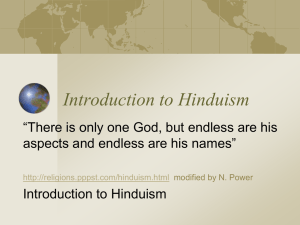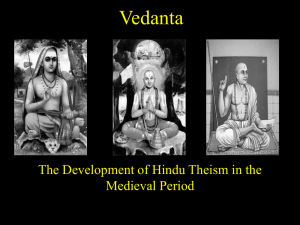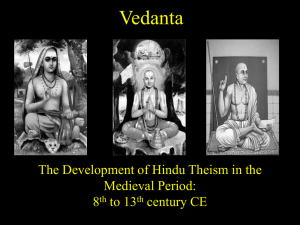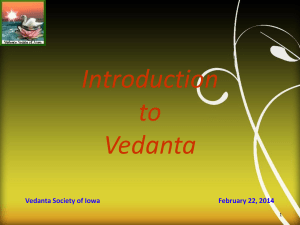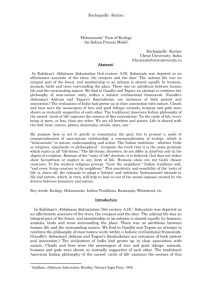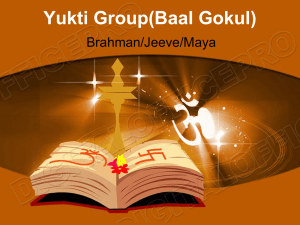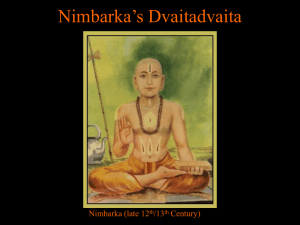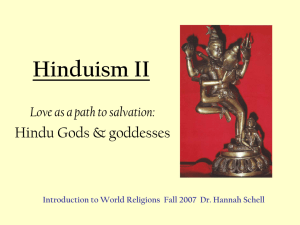Ramaunjuaintroduction
advertisement
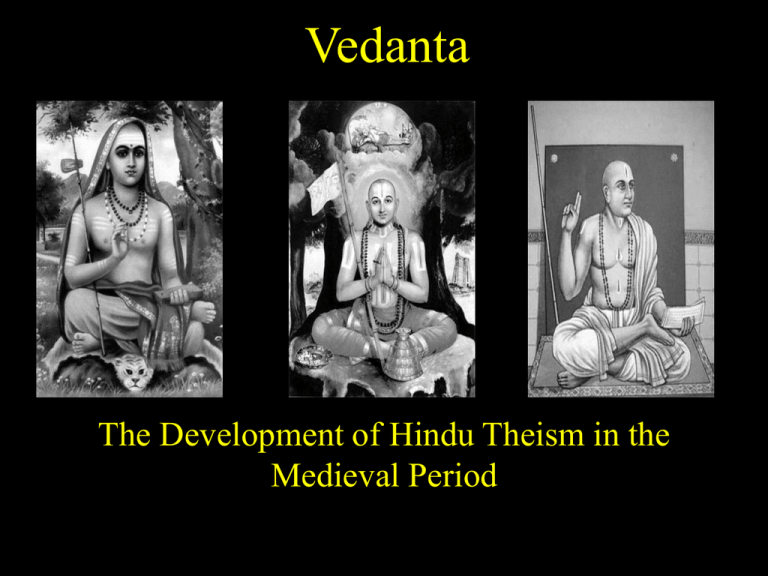
Vedanta The Development of Hindu Theism in the Medieval Period Ramanuja’s Vishishtadvaita Vedanta Ramanuja (12th Century) Ramanuja’s Critique of Sankara Where is avidya (ignorance) located? in Brahman? Brahman is evil. in the Jiva (individual soul)? in some other thing? Brahman is evil. (Jiva in its real nature is one with Brahman.) Dualism Ramanuja concluded that, on Sankara’s view, either Brahman is evil or Sankara’s non-dualism is false. Hence, Sankara’s system is self refuting. Ramanuja’s Critique of Sankara Related Argument (1) Either the distinction between Brahman and avidya is real or it is not. (1) If the distinction between Brahman and avidya is real, then non-dualism is false. (1) If the distinction between Brahman and avidya is not real, then Brahman and avidya are identical. Hence: (4) Either non-dualism is false or Brahman and avidya are identical. Ramanuja adopted a qualified non-dualism Brahman is real and ultimately personal Jivas are real individual souls. Brahman and Jivas are really distinct. Jivas are parts of Brahman. The Personal Nature of Brahman Like all Bhakti Vedantins, Ramanuja held that Brahman is an Absolute or Supreme personal being endowed with auspicious attributes. “Brahman denotes the highest Person [Purusha] . . . free from all imperfections and possessing numberless classes of auspicious qualities of unsurpassable excellence.” ~ Ramanuja (Vedanta Sutras, p. 4) The Names of God Ramanuja refers to the Supreme Being by various names, including Brahman, Narayana, Vishnu, Ishvara, Bhagavan, and Purushottama. Krishna is the incarnation of Vishnu. Attributes of God Svarupa (inherent nature): Truth, Knowledge, Infinity, Immeasurable Bliss, Incorruptible Purity. Svabhava (auspicious quality): omniscience, omnipotence, lordship, creative power, immutability, splendor, generosity, compassion. “We know from Scripture that there is a Supreme Person whose nature is absolute bliss and goodness; who is fundamentally antagonistic to all evil; who is the cause of the origination, sustenance, and dissolution of the world; who differs in nature from all other beings; who is all-knowing; who by his mere thought and will accomplishes all his purposes; who is an ocean of kindness as it were for all who depend on him; who is all-merciful; who is immeasurably raised above all possibility of anyone being equal or superior to him; whose name is the Highest Brahman.” ~ Ramanuja (Vedanta Sutras, p. 770) For Ramanuja, Brahman is a maximally perfect personal being. Brahman and the Universe Brahman is the efficient and material cause of the universe. Brahman not only creates the universe as an agent, but he is that out of which the universe of sentient and non-sentient forms is made, though he remains distinct from creation. “The entire world is a body the Self of which is constituted by knowledge abiding apart from its worldbody.” ~ Ramanuja The soul controls and guides a person’s body, but the soul is unaffected by the body. Similarly, Brahman directly sustains, controls, and guides the universe, and Brahman is also unaffected by the universe. Brahman and Jiva Souls Ramanuja affirms the reality of a plurality of individual, finite, eternally existing jivas (souls), distinct from each other and Brahman. Jivas are immaterial, self-conscious, agents, endowed with a blissful nature. Jivas are not independently existing entities but actually parts of Brahman and thus inseparable from Brahman. Metaphysically, jivas are attributes of a divine substance. Tat tvam asi: “That Thou Art” Tat: Ishvara as the indweller of the cosmic body Tvam: Ishvara as indweller of the jiva soul “You (jiva) are the body/part of Brahman.” The Way of Union with Brahman Union with Brahman involves union with God who is a personal being and the Lord of Love. Union is achieved through bhakti (love), which involves dhyana (meditation) and upasana (continuous thought) directed towards God, which in turn may require as a preliminary stage: Karma Yoga: Acting without attachment to the fruit of one’s action. Detachment. Jnana Yoga: Overcoming the false identification of self with one’s body. Knowledge. Disciplines that Cultivate Loving Devotion 1.) Viveka: Discrimination in food. 2.) Vimoka: Resist the impulses of passions like anger, sexuality, and jealousy. 3.)Abhyasa: worship activities like japa (chanting), collective singing of God’s name, and visiting holy places that will remind one of God’s presence in the self and world 4.)Kriya: Performance of vedic duties, e.g., sacrifices, social and professional duties. 5.) Kalyana: virtues such as truth, kindness, benevolence, and love of all beings. 6.) Anavasada: Cheerful attitude of mind. 7.) Anuddharsa: even temperament. Moksha In the state of liberation (moksha), jivas retain their individuality. They are not merged into formless Brahman, as in Advaita Vedanta. In their liberated state Jivas attain the abode of Vaikuntha, the abode of Narayana and his form (a heavenly realm outside maya), where Narayana’s auspicious attributes are visible.
